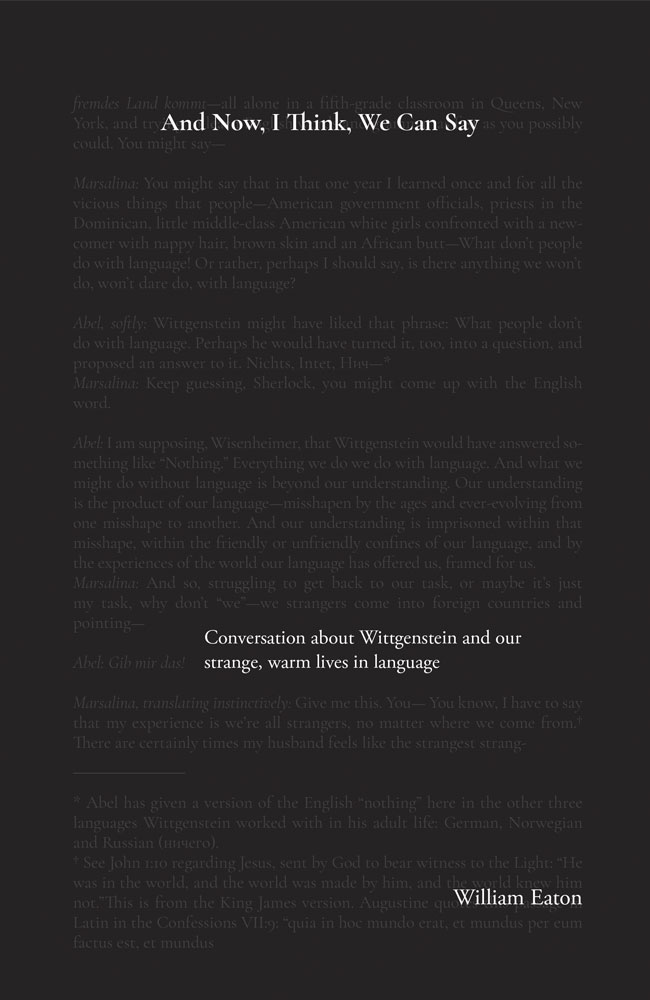Publishers of international
prose, poetry, art,
and literary hybrids.
Book
And Now, I Think, We Can Say: A conversation about Wittgenstein and the comforts of our life in language
The warmest, funniest, most erudite and ambitious philosophical dialogue of the twenty-first century? A lonely professor in a bookstore café overhears someone trying to explain Wittgenstein to a good friend–the two of them once having come close to an adulterous affair? The professor surreptitiously records their conversation, and then adds on top of it all his own ideas about Wittgenstein’s philosophy, biography and psychology. A post-modern, Platonic exploration of how and why we human beings still try to speak and be heard. All our life in language (our most sophisticated philosophies included) keeps revolving around the fixed point of our real if unmeetable need: to find love and understanding?
Author: William Eaton
Paperback : 348 pages
ISBN-10 : 1947175394
ISBN-13 : 978-1947175396
About the Author
Award-winning journalist, essayist, novelist, artist and writer of intellectual dialogues. William Eaton’s “The Professor of Ignorance Condemns the Airplane” was staged in New York in 2014. Serving House published his Surviving the Twenty-First Century (personal essays) and Art, Sex, Politics (intellectual essays). His trilingual Montaigbakhtinian blog is followed by 5,000 readers worldwide.
As is clear from the start, William Eaton has not so much studied Wittgenstein as interiorized him, and with all the intimacy that implies. As language games were anything but games for Wittgenstein, so the witty, at times even chatty, progress of And now, I think, we can say is full-on serious. The genuine questions are raised and reflected upon and the life of a mental traveller all but surrounds us as we read.
— Sven Birkerts, author of Art and Attention in the Internet Age
A remarkably creative, contrapuntal text. Interweaving personal experience, imagined dialogue, passages from Wittgenstein, and passages from Wittgenstein’s biographers, with (on occasion provocatively idiosyncratic and psychoanalytically speculative) interpretations of Wittgenstein’s writings, remarks, letters and diaries, and with engagingly wide-ranging references and asides, William Eaton uncovers a good deal about the subtleties that determine the meaning of what we say and write. Creative writing, intricate biographical assemblies, and scholarly reflections intertwine here to show that words—anything but abstract blunt instruments—are always the words of a person, always the voice of a sensibility.
—Garry L. Hagberg, author of Describing Ourselves: Wittgenstein and Autobiographical Consciousness, and Living in Words: Literature, Autobiographical Language, and the Composition of Selfhood
If our responses to Wittgenstein, as to our language itself, can become all too settled—like well-worn paths across a landscape we’ve largely ceased to see—And Now, I Think, We Can Say appears as an unexpected visitor who wrests us from our familiar ways and reveals the mysteries and (sometimes frightful) wonders of our home.
Taking the form of a conversation between a pair of old friends about a single section of Wittgenstein’s Philosophical Investigations—a conversation overheard, transcribed, and extensively commented upon by an exceptionally erudite humanities professor—And Now combines close textual exegesis with an insistent contextualization often missing in philosophy—contextualization within the circle of ordinary human cares and concerns, within the historical period of Wittgenstein’s life, and within the dynamics of the Wittgenstein family and Ludwig’s own psychology and sexuality.
The result is a powerfully unsettling reading of Wittgenstein that is less focused on the comforting stability of the ordinary than on highlighting the ambiguous, the exceptional, and the wayward voices of the Investigations and that calls on us to consider how much of our philosophical loquaciousness is designed to distract from what we will not say—that we remain, ineliminably and essentially, strangers to our language, our world, others, and ourselves.
— Steven G. Affeldt, Associate McDevitt Chair in Religious Philosophy, Le Moyne College
Eaton’s book takes Wittgenstein’s words and looks past their facing surfaces and to the vast, ramiculated network of lines that tie those words to Wittgenstein’s life, to our lives, and to life. The book reminds us that words want more life and more-than-life. As Wittgenstein once wrote, how words are understood is not told by words alone. Eaton’s Cubist reading of Wittgenstein reveals the startling hosts of points of view in Wittgenstein’s texts and the resolute depths at which Wittgenstein investigates the interrelationships between points of view and the possibility of meaning.
—Kelly Dean Jolley, Goodwin-Philpott Professor, Auburn University, author of The Concept ‘Horse’ Paradox and Wittgensteinian Conceptual Investigations, as well as Stony Lonesome (a book of poetry). Editor of (and contributor to) Ludwig Wittgenstein: Key Concepts
"I admire [Serving House Books] for the quality work they’re putting out plus the notable writers they’re publishing."
Jack Smith, The Writer Magazine

